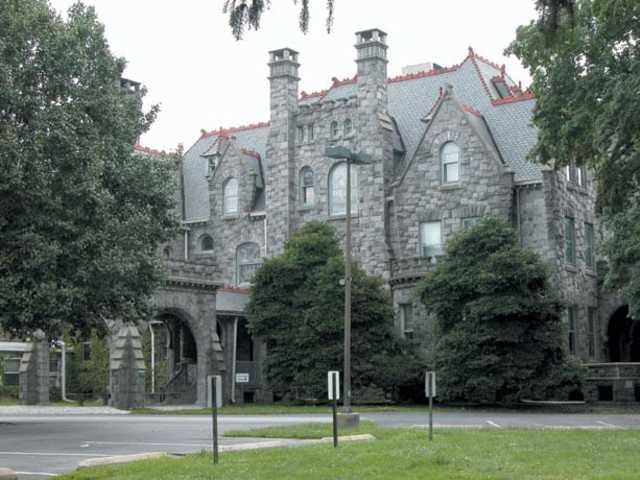






KeyStone Center Extended Care Unit
Verified Center
This provider's information has been quality-checked by Recovery.com's Research Team for accuracy and completeness, including center verification through appropriate third-party organizations.
Treatment Focus
This center provides behavioral addiction treatment tailored to your unique concerns and symptoms, all in a supportive and compassionate environment.
Primary Level of Care
Offering intensive care with 24/7 monitoring, residential treatment is typically 30 days and can cover multiple levels of care. Length can range from 14 to 90 days typically.
Treatment Focus
This center provides behavioral addiction treatment tailored to your unique concerns and symptoms, all in a supportive and compassionate environment.
Primary Level of Care
Offering intensive care with 24/7 monitoring, residential treatment is typically 30 days and can cover multiple levels of care. Length can range from 14 to 90 days typically.
Private Pay
You pay directly for treatment out of pocket. This approach can offer enhanced privacy and flexibility, without involving insurance. Exact costs vary based on program and length of stay. Contact the center for specific details.
KeyStone Center Extended Care Unit
KeyStone Center Extended Care Unit
About KeyStone Center Extended Care Unit
Since 1994, KeyStone Center Extended Care Unit (ECU) has been a pioneer in the field of sex addiction treatment. Specializing in internet and pornography addiction, intimacy disorders, sexual anorexia, and relationship challenges, KeyStone provides a sensitive, judgment-free environment where men can begin to heal. With an intensive 30-day residential program that features a 1:1 client-to-provider ratio and a full 7-day therapy schedule, clients receive personalized care that is dedicated to supporting recovery from trauma and compulsive thoughts and behaviors.
Address Root Causes, Not Just Symptoms
At KeyStone ECU, men take a deep dive into healing sex addiction. The program is intimate and focused, with only 16 beds and therapy from professional sex addiction experts. They use techniques like eye movement desensitization and reprocessing (EMDR) and art therapy that help heal emotions that words can’t always capture. Their daily therapy sessions include individual counseling, group support, and family work to address every aspect of recovery. Because they don’t just treat symptoms, men can expect to uncover and heal the root causes of addictive behaviors—whether it’s past trauma, relationships issues, or deep-seated emotional pain.
Treat Hidden Struggles with Compassion
Beyond the common struggles with porn or cybersex, KeyStone understands the full spectrum of sexual compulsions men might face, including those they may feel ashamed to name. For men who avoid intimacy due to past trauma or obsessively seek romantic connections, KeyStone treats these conditions and offers safety and discretion in the process.
Experience Home-Like Comfort
At Keystone Center ECU, men find a comfortable environment for healing. Unlike sterile, clinical settings, their 16-bed facility in Philadelphia has a more home-like feel. If traveling to treatment poses a challenge, KeyStone can help arrange transportation, taking the stress out of logistics. 30 days at Keystone can be thought of as a retreat, where men can truly disconnect from distractions and reconnect with their best selves in a supportive community.
Highlights from the Center
Highlights
These highlights are provided by and paid for by the center.
Customized Treatment Plans
Utmost Confidentiality
Men Only
Center Overview
Treatment Focus
This center provides behavioral addiction treatment tailored to your unique concerns and symptoms, all in a supportive and compassionate environment.
Joint Commission Accredited
The Joint Commission accreditation is a voluntary, objective process that evaluates and accredits healthcare organizations (like treatment centers) based on performance standards designed to improve quality and safety for patients. To be accredited means the treatment center has been found to meet the Commission's standards for quality and safety in patient care.

Pricing and Program Length
Estimated Center Costs
The cost listed here (Call for rates), is an estimate of program cost. Center price can vary based on program and length of stay. Contact the center for more information. Recovery.com strives for price transparency so you can make an informed decision.
Meet Your Care Team

Dr. David Pellack
Clinical Director
PhD, LPC, CSAT, EMDR trained

Jordana Blumenfield
MA, NCC, LPC, CSAT

Nicholas Harris
Therapist
M.Ed.

Robert Ryan
Clinical Social Worker
MSS, LCSW, MBA

Nancy Roberts Willis
Psychodramatist
M.S.W., LSW, CP

Paul Greway
Recovery Counselor

Judith Curcio
Trauma-informed Art Therapist




Levels of Care




Your Care Options
Specializations
Pornography Addiction
A person with a porn addiction is emotionally dependent on pornography to the point that it interferes with their daily life and relationships.
Eye Movement Therapy (EMDR)
Lateral, guided eye movements help reduce the emotional reactions of retelling and reprocessing trauma, allowing intense feelings to dissipate.
Professionals
Busy, high-ranking professionals get the personalized treatment they need with greater accommodations for work, privacy, and outside communication.
Post Traumatic Stress Disorder
PTSD is a long-term mental health issue caused by a disturbing event or events. Symptoms include anxiety, dissociation, flashbacks, and intrusive thoughts.
Sex Addiction
Compulsively seeking out sex can easily become a problem. This addiction is detrimental to relationships, physical health, and self-esteem.
Trauma
Some traumatic events are so disturbing that they cause long-term mental health problems. Those ongoing issues can also be referred to as "trauma."
Who We Treat
Approaches
Evidence-Based
A combination of scientifically rooted therapies and treatments make up evidence-based care, defined by their measured and proven results.
Twelve Step
Incorporating spirituality, community, and responsibility, 12-Step philosophies prioritize the guidance of a Higher Power and a continuation of 12-Step practices.
Gender-Specific
Separate treatment for men or women can create strong peer connections and remove barriers related to trauma, shame, and gender-specific nuances.
Therapies
1-on-1 Counseling
Patient and therapist meet 1-on-1 to work through difficult emotions and behavioral challenges in a personal, private setting.
Trauma-Specific Therapy
This form of talk therapy addresses any childhood trauma at the root of a patient's current diagnosis.
Art Therapy
Visual art invites patients to examine the emotions within their work, focusing on the process of creativity and its gentle therapeutic power.
Couples Counseling
Partners work to improve their communication patterns, using advice from their therapist to better their relationship and make healthy changes.
Eye Movement Therapy (EMDR)
Lateral, guided eye movements help reduce the emotional reactions of retelling and reprocessing trauma, allowing intense feelings to dissipate.
Family Therapy
Family therapy addresses group dynamics within a family system, with a focus on improving communication and interrupting unhealthy relationship patterns.
Psychodrama Therapy
Patients act out real or imagined scenarios under a therapist's guidance. These exercises foster creative thought, sponteneity, and problem-solving skills.
Twelve Step Facilitation
12-Step groups offer a framework for addiction recovery. Members commit to a higher power, recognize their issues, and support each other in the healing process.
Conditions We Treat
Pornography Addiction
A person with a porn addiction is emotionally dependent on pornography to the point that it interferes with their daily life and relationships.
Codependency
Codependency is a pattern of emotional dependence and controlling behavior. It's most common among people with addicted loved ones.
Sex Addiction
Compulsively seeking out sex can easily become a problem. This addiction is detrimental to relationships, physical health, and self-esteem.
Trauma
Some traumatic events are so disturbing that they cause long-term mental health problems. Those ongoing issues can also be referred to as "trauma."
Substances We Treat
Co-Occurring Disorders
A person with multiple mental health diagnoses, such as addiction and depression, has co-occurring disorders also called dual diagnosis.
Languages






